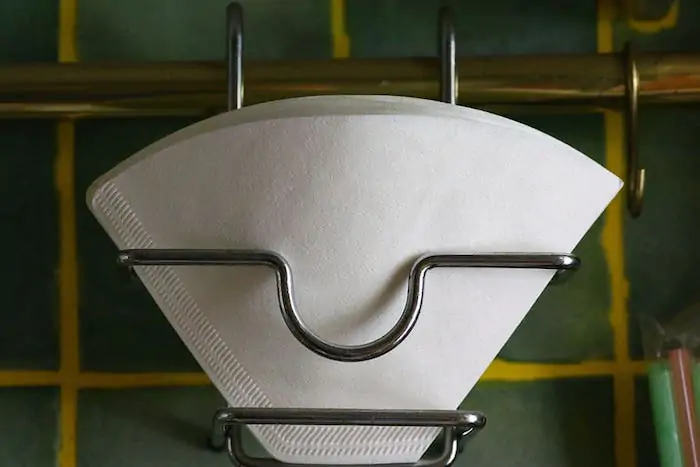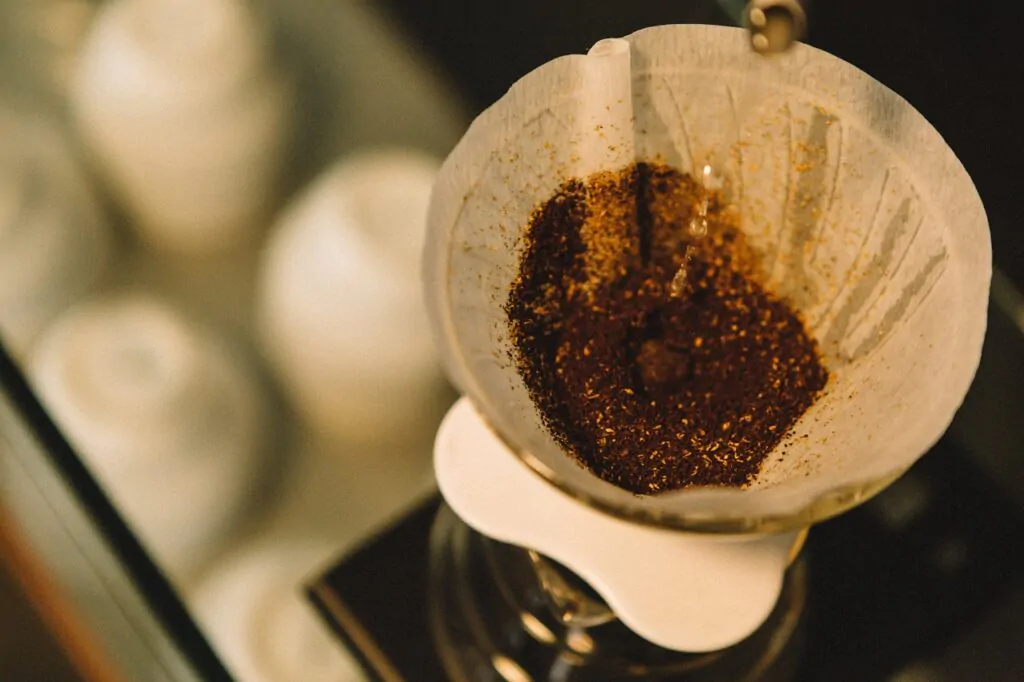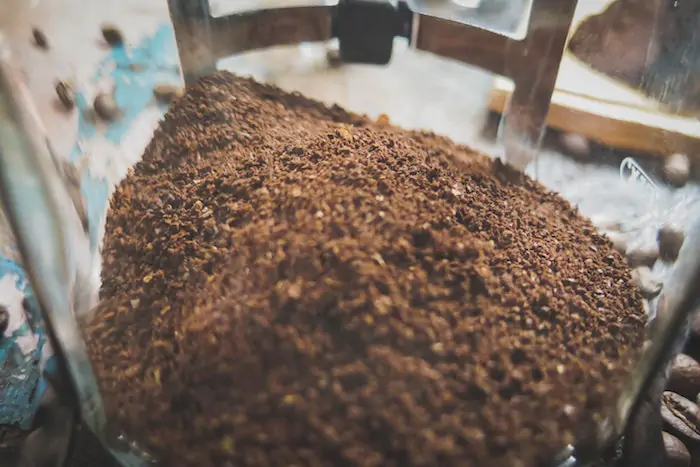Coffee grounds can go in the compost – but can coffee filters be composted?

When I first started building my compost, I didn’t add anything but organic materials and natural foods. I’d heard of people composting their newspapers or paper towels, but I couldn’t believe that it would be good for my soil.
But after months of composting coffee grounds and throwing the filter away, I started to rethink my no-paper philosophy. Coffee filters are super thin and break down easily, so why couldn’t they go in the compost bin?
Can coffee filters go in the compost? Yes, any paper coffee filter will break down in your compost pile. Make sure your filters don’t have a wax coating, metal border, or any other artificial elements.
Organic gardeners should be aware that white coffee filters may have been treated with bleach or other chemicals.
Coffee filters aren’t just compostable; they’re actually better for your compost heap than if you added coffee grounds on your own. Now that I know how easily coffee filters break down, I always add them to my compost heap – and I bet you will, too.
The Coffee Filter Compost Debate
Most gardeners add coffee grounds to their compost heaps, but not all of them include the filters. Whether or not to include the paper filter is a mild debate in the gardening community; the answer really depends on what kind of compost you want to create.
Which Coffee Filters Can Be Composted?
The only coffee filters that can be composted are made entirely out of paper or other natural materials. Paper and cloth are both biodegradable, but other materials are not.
Both brown and white paper coffee filters are safe to compost. Brown filters are typically unbleached, so they may be better for your soil composition.
No matter what, you should never compost a filter that has a metal or plastic border. These elements might help with the brewing process, but they won’t break down in your compost heap.
Some coffee systems use special filters. Before you place these in the compost, double-check the packaging to make sure they have no artificial components. Many compost-friendly filters will be labeled as such.
Reasons To Compost Your Coffee Filters

If you’re anything like me, you want to compost your filters because it’s more convenient. Instead of scraping coffee grounds off the filter every morning, why not just toss the whole thing into the compost bin?
There’s nothing wrong with this instinct. Coffee filters are completely biodegradable, so they’re a fine addition to your compost. In fact, they might even be beneficial to your organic culture.
This is because coffee filters are a bulky, high-fiber material that can be used to make a “dry” layer in your compost bin. Coffee filters make an excellent supplement or replacement for leaves, newspapers, grass, and other compost staples.
Coffee filters actually count as brown compost material. When you’re building a compost heap, you need a fairly even ratio of brown materials, which are high in carbon, and green materials, which are high in nitrogen and other nutrients. Coffee grounds are green material, so your best bet is to add them at the same time.
Many gardeners have also noticed that coffee filters are a big hit with compost worms. This is because the filters mimic the grass or newspaper bedding that the worms are used to nesting in, and they’re also soaked with coffee – which worms love.
Reasons Not To Compost Your Coffee Filters
The gardening community is generally in favor of composting coffee filters, but gardeners prefer to only use organic materials. This means leaving the filters, and sometimes even the coffee grounds, out of the mix.
Organic gardeners don’t like to compost most coffee filters because they may have been treated with bleach or other chemicals. Coffee filters are usually FDA-approved, but some people still worry that the treated filter could negatively impact their soil composition.
There’s also the concern that, unless your compost is correctly managed, your coffee filters won’t break down. Purely organic compost heaps are easier to work with and are likely to break down more quickly.
It’s true that there are no studies confirming how coffee filters interact with compost. Most gardeners who compost their filters are relying on personal experience. With that said, the general consensus seems to be that coffee filters are anywhere from harmless to beneficial for your compost heap.
How To Compost Your Coffee Filters

Compost breaks down naturally, but it still takes work to make a functioning compost heap. Most starting compost piles are built from alternating layers of fibrous materials like grass or paper and nutrient materials like food and soil.
Coffee filters are an excellent choice for the fibrous layers in your compost heap. If you don’t go through that many filters, you can supplement your supply with paper towels, cut grass, or leaves. Either way, follow the same process to get great coffee-filter compost.
- Collect coffee filters and grounds. For a new compost heap, you may want to collect a few day’s worths of coffee filters. If you already have a functioning compost, you can add your filters one at a time.
- Spread the filters in a thin layer. Coffee filters won’t break down if you leave them in a large mass. Instead, lay them out flat in the center of your compost pile.
- Mist the filters with your hose. Coffee filters need moisture to decompose. Get your compost pile wet but not muddy.
- Add other organic materials. Although coffee filters and grounds are a great start, you’ll see the best results by including things like eggshells, vegetable ends, and fruit scraps.
- Cover with topsoil. Place at least an inch or two of soil on top of your filter layer. You can use regular dirt, potting soil, or even successful compost.
You don’t always have to compost your filters in large batches, but you do need to make sure that they’re covered with soil. Filters left on the top of your compost heap will dry out and may even blow away in the wind.
Dry compost heaps don’t decompose properly, so make sure to water them on a semi-regular basis. You should also rotate your compost once every 2-3 months to ensure even decomposition.
The Benefits Of Composting Coffee Grounds
When you first start a compost bin, adding coffee grounds seems like a natural step. They look like dirt, and they don’t go rotten like other foods, which can make your compost smell a lot better. But are coffee grounds and filters actually good for your compost heap?
The answer is yes, especially if your soil is low in nitrogen. If used correctly, coffee grounds will make your compost heap significantly healthier and more effective.
What Coffee Grounds Add To Your Soil
Coffee grounds are an important source of nitrogen. Plants need nitrogen to survive; without it, they can’t build new cells.
When plants are grown in soil, the nitrogen content naturally starts to deplete. This is why many gardeners use coffee-enriched compost or even mix coffee grounds directly into the soil.
Adding coffee grounds to your compost is also great for the soil’s texture and composition. A layer of coffee grounds is well aerated and has better drainage than tightly-packed dirt.
Finally, many gardeners believe that coffee grounds keep snails, slugs, and other pests away from your plants. This hasn’t been scientifically verified. However, it is true that coffee grounds attract worms, and worms have been shown to reduce slug damage by as much as 60%.
Related Article: CAN YOU PUT COFFEE GROUNDS IN THE GARBAGE DISPOSAL?
Coffee Grounds And Compost Worms

Compost worms are incredibly helpful for breaking down your compost heap. Most compost piles will naturally attract their own worms, but you can also purchase additional worms from your local nursery or gardening store.
Compost worms absolutely love coffee grounds. Adding coffee grounds will help you attract worms to your compost, especially if you place them at the bottom of the pile. The worms also eat and burrow through coffee filters, which helps them break down faster.
Just make sure that you don’t add too many coffee grounds; pure coffee is not good for the worms’ health. This shouldn’t be a problem as long as you always mix the coffee grounds with other food scraps like fruit peels and eggshells.
How Much Coffee Should You Add?
The key to a great compost pile is to carefully balance the ingredients inside. Too much of any one food will impact the soil composition – especially if the ingredient is as volatile as coffee.
The nitrogen content of coffee grounds is about 2%. Based on the ideal nitrogen to carbon ratio for a compost heap, you can safely have a coffee content of up to 25%. Coffee grounds should always be added with an equal amount of other carbon materials.
Luckily, coffee grounds have a neutral PH, so they won’t mess with the acidity in your compost pile. As long as your compost isn’t full of other nitrogen-rich substances, you should be fine to add the grounds from your daily coffee.
Related Questions
How long do coffee filters take to biodegrade?
Coffee filters usually break down in around 6-8 months. This time may be faster if your compost heap is well-rotated and has a high internal temperature.
Are coffee filters green or brown compost?
Coffee filters count as brown compost, and coffee grounds count as green. Adding both at the same time is a good way to balance the green and brown mixture of your compost heap.
